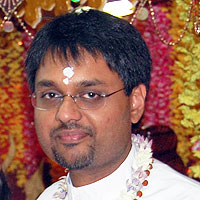Ashram means “a place of spiritual shelter”. Each stage of life is not only a natural part of the journey from the cradle to the grave but also a time in which spirituality can be developed. The four ashrams or stages of life have been instituted by the seers of Hinduism in an effort to take man along this journey. Outlined below is a brief explanation of these four stages of life.
1. The Brahmacharya or Student Stage
This ashram begins when the youngster is initiated into formalized means of education. This initiation is what constitutes the second birth.
In the classical and medieval period of India’s history, the initiation would mark the time when the initiated left home to live and study with a guru. During this period, the young man lived a highly disciplined life and studied the Vedas and religious rituals. However, this would be different in modern times, as we now have both secular education coupled with religious education. Hinduism emphasizes on both as equally important.
The spiritual teacher would teach him the ways of personal purification, devotions to god and sacrifices such as fasting and yagyas. He was expected to be completely devoted to his teacher and his studies. The Laws of Manu forbade specific things: i.e. meat, girlfriends and gambling to name a relevant few. All of these were believed to pollute or to detract attention from studies. This is practical knowledge, for all of these are distractions that boys encounter on a daily basis.
A young man remained a student until it was time for him to marry and to become a productive member of society. Marriage was regarded as the natural state. To deviate from this path was considered unusual and shameful. This shows in some way, Hinduism’s position on same-sex marriages. A strong emphasis on marriage between man and woman can be observed in the life stories of SitaRam, ShivaShakti and RadhaKrishna which also demonstrate ideals of fatherhood as well as motherhood.
2. The Grihasta or Householder Stage
The male enters the household stage in his early twenties. During this period, the young man would raise a family, pursue an occupation, establish himself as financially independent and as a responsible contributor to society.
Due to the householders’ importance to the wellbeing of the social order, the Laws of Manu proclaim this is the most excellent stage. It is at the householder stage that we see life of males and females most closely intertwined.
3. The Vaanprasta or Semi-Renunciate Stage
The Laws of Manu go on to specify a third and fourth stage for men beyond the householder stage. These final two ashrams pertain to the pursuit of religious objectives. This does not mean that he withdraws from his family entirely. Instead, he becomes more introspective and devoted to our eternal father, Parampita-parameshwar. It is important to note that this stage begins only after a man has raised a family, earned an income and discharged his obligations to society.
The Laws of Manu were very interested in keeping men in their prime at the householder stage, where they could be productive members of society. That role is that as a father. It seems that these codes were a response to what had become something of a problem: Young men leaving off searching religious experiences or even digressing to other unconstructive activities before they could be of any use to society. In this sense, the ashrams were intended to regulate religious behavior by delaying religious experience until one’s later years.
4. Sanyaasa or Renunciate Stage
The fourth stage of life is an especially interesting one. It is a stage of rigour and austerity that few men would embark upon. This is the ashraam known as Sanyaasa or “renunciation”. This stage in modern times can be and is interpreted and practised differently. Fathers are encouraged to be sources of guidance and maturity for generations under them, for example, as pillars of strength in the home, as grandfathers and great grandfathers.


